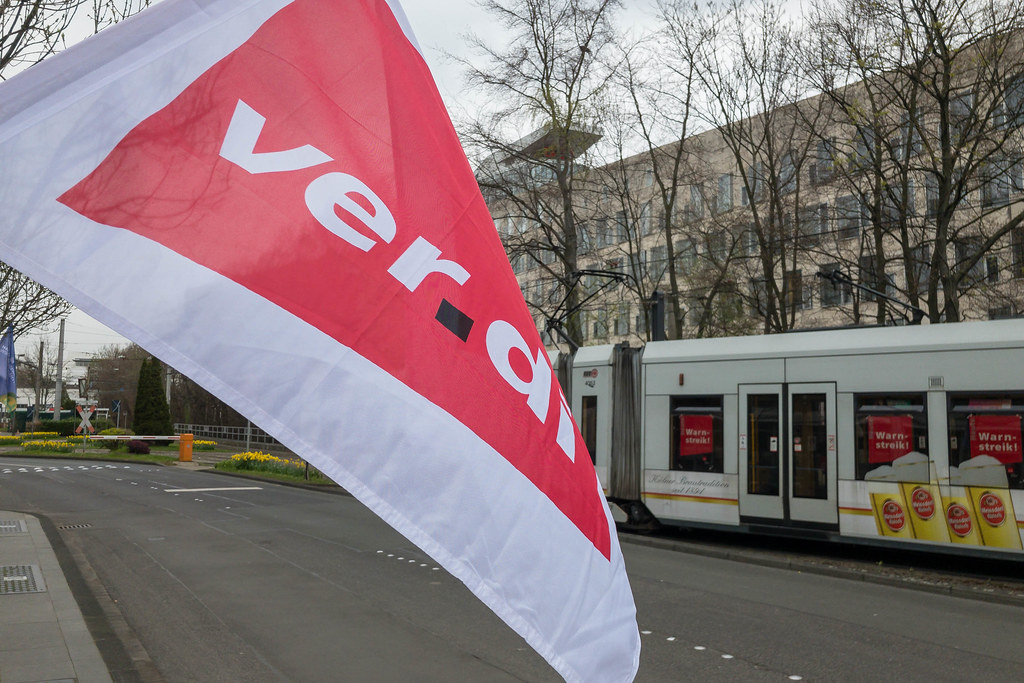Hello Beatriz. Could you start by just saying a few words about who you are?
Hi Phil. I’m a migrant worker from Spain, currently based in Munich, where I work as a social researcher. I do empirical research on labour in different settings, ranging from factories to hospitals. Before that I lived in Berlin, and later in London. During that time, I was a student and part of different grassroots movements, like the [Spanish anti-austerity movement]15-M and the labour union UVW [United Voices of the World].
Now, I’m a PhD scholar of the Rosa Luxemburg Foundation (Rosa Luxemburg Stiftung, RLS), and investigate workers’ perception of domination in digitalised factories.
Transform! Europe has just issued a new dossier Coalition of Labour: Worker’s Voice in Europe to which you contributed the chapter on Germany. What is the aim of the dossier, and how did you get involved?
I got to know about the possibility of participating in the empirical research that Transform! Europe was planning through the RLS-network. The project immediately appealed to me, so I got in touch with the organisers in Germany and Italy and applied to be part of it.
The purpose of the research was to find out how people in different European countries – Italy, France, and Germany – felt about their living and working experiences. We wanted to know how the changes in the labour markets in those countries affected peoples’ lives and self-perceptions, how they relate to politics in a broader sense, meaning welfare state institutions, labour unions… and to other workers as well.
We also asked our interviewees – men and women in very different life and work situations – about their prospects and wishes for their personal and collective future. And of course, how the COVID-19 pandemic, and the responses to it, affected them on different levels.
The product of this empirical research is a lively picture, a sort of colourful mosaic made of peoples’ testimonies— who, despite their differences, often share common experiences of inequality and injustice, but also of solidarity and hope.
You say that ‘the so-called German “employment miracle” has been accompanied by a rising prevalence of low hourly pay’ – with many people being paid well below the minimum wage and having to work unsocial hours. How strong is the German economy, and are workers benefiting?
This is an interesting question, and the answer to it depends on how we define the German ‘economy’. Our research tells us something which is by no means new, but still worth emphasising one more time: that the ‘economy’, far from being distinct, homogeneous system, closed in itself, is in fact marked by inequalities, conflicting interests, blurred limits and interdependencies with other social spheres –like the household, the ‘informal’ economy, the education system, etc.
The strength of the German economy, like every other one, depends upon the exploitation of both waged and unwaged, visible and invisibilised labour, in the workplace, in the household, in other countries… Thus, the benefits of relative minority go hand in hand with the life and work precarisation of many others, and with the reproduction and further deepening of inequalities on the grounds of class, gender, nationality, ‘race’, etc.
And, again, this is nothing new, but far from outdated either. It has indeed been further aggravated by the COVID-19 pandemic and the political responses to it.
The dossier also covers France and Italy. How do you think Germany compares with what is happening elsewhere in Europe?
Of course there are differences not only among countries, but also within them, among workers. However, the interviews exemplify the general deterioration of the working conditions of European workers: great contractual instability and the perception of a decreasing control over one’s own employment situation were common among respondents.
Job insecurity is coupled with low compensation, and more people, here and in the other two countries we considered, are faced with a trade-off between decent employment conditions and earning enough for meeting their own needs. Workers are increasingly forced to accept overtime and working multiple jobs as the only viable solution to low wages.
In the interviews I conducted in Germany, the interviewees widely held the belief that the conditions of the labour markets were exceptionally favourable, in comparison to other countries. Again, there are aspects where this might be the case. Still, slash workers, that is, people doing more than one job at once, were common among the respondents in Germany too.
How has Covid-19 affected German workers and unemployed people? For example, what was the experience of Kurzarbeit?
The Kurzarbeit is a very good example of how the responses to the COVID-19 in Germany have affected workers unequally, and sometimes even reinforced existing inequalities.
First, because Kurzarbeit was a measure which especially applied to employees in relatively secure employment relations. Those workers who were, for instance, in probation time, subcontracted, temporary workers, apprentices… they didn’t get any Kurzarbeit, in most cases, they simply lost their jobs during the crisis.
Just like people working in the gastronomy sector. One of the interviewees, a young man doing several jobs at the same time, one of them as a waiter, told us how the combination of lockdown plus years of gentrification in the city where he works and lives meant that the bar where he worked had to shut down, and he lost his main source of income overnight.
So, we see also there how this current crisis is intertwined with other elements of our capitalist systems that were already there, and then got reinforced or accelerated by the COVID-19 pandemic. But also among those workers who did get Kurzarbeit we find big differences.
Our interviews show how for those workers in employment situations with relative high levels of employment security and pay, a reduction of working time and wage didn’t imply serious financial constraints. Moreover, Kurzarbeit gave them the possibility of having more free time for other activities, which they often perceived as more meaningful than labour, like political activism, leisure, family time…
On the other hand, for workers with part-time jobs, earning 600€/month, a reduction of wage and working time meant not being able to pay their rent anymore.
Your findings on the politicisation of migrant workers appear to be contradictory. On the one hand, the non-Germans who you interview tend to have a higher level of political awareness. On the other, you report that for various reasons (language, a sense of only being here temporarily, precarious jobs), migrants are also less engaged in German politics. Is this a contradiction? If not, how can it be resolved?
Yes, I find this also very interesting. In my experience as a migrant worker, and as a person who has been engaged in different kinds of social and labour movements with a great majority of migrant people, I don’t necessarily see it as a contradiction. I think it has to do with the little openness and approachability of institutions like traditional labour unions towards migrant people, in particular, and towards ‘atypical’ workers, in general.
It is not by chance that migrant people are overrepresented among ‘atypical’ workers, by which I mean fix-termed, part-time, temporary, often precarious workers, all things that today, and since a couple of decade, are not so ‘atypical’ anymore…
So, it’s a mixture of factors, on the one hand, these structural obstacles: as you said, the language barrier; the sense of only being here for a short period of time, whether this ends up being the case or not is another question; the lacking citizenship rights, that is, not being able to vote in most of the elections in Germany; not having enough labour-free time because of multiple, precarious jobs…
And on the other hand, as I said, the still unresolved problem with traditional labour unions, which unfortunately fail to make space for the needs and circumstances of migrant workers, among other groups of workers.
However, the fact that migrants are often not engaged in German politics, because of all these reasons, does not mean that they are not politically engaged in Germany at all. I mentioned before the grassroots movement 15-M, of which I was part during my time in Berlin. Following the financial crisis of 2007, the 15-M expanded from Spain to different cities across Europe, where mostly young, highly qualified people, without future perspectives in their country of origin but thirsty for a radical change in the system, migrated.
The 15-M as such does not exist anymore, neither in Spain nor elsewhere, but some initiatives that were launched under its spirit, like the “Oficina Precaria” in Berlin, are still active and they do a very important job, supporting and giving advice to migrant people who struggle with the job centre, abusive employers and landlords, etc.
This is an example of self-organisation by migrant workers, not through the official institutions, but in response to them. That is, either looking to compensate a lack of support, like in the case of labour unions, or looking to solve problems with those institutions, like the job centre.
Your report says that the gender pay gap has narrowed in Germany in recent years – but only by a few percentage points. What is changing, and is it changing quickly enough?
The gender pay gap has to do with various factors, but at the origin of it there is a gender division of labour. This is a structuring feature of our capitalist and patriarchal systems, deeply rooted in our minds, cultures, institutions, etc., and therefore not so easy to subvert. This gender division of labour is also another expression of capitalist exploitation, and a key factor upon which the strength of the German ‘economy’, about which we talked before, depends. And the same applies to the French, the Italian, the Spanish…
What is changing? Look, I always try to be optimistic and find reasons for hope, but with regards to this issue, I don’t see much change, unfortunately. If I look in my personal circles, If I look at the numbers and statistics, if I look at other empirical, qualitative reports…everywhere I see that women do most of the unpaid, invisibilised reproductive work. Very often on top of their waged activity.
Of course, there are many people exploring other ways of caring for each other that break with this patriarchal and exploitative model: collectivising care, challenging gender roles and expectations, questioning productivist ways of living, feeling and thinking, and looking for other sources of meaning and fulfilment beyond economic success and the centrality of waged labour. But in my view, this isn’t changing quick enough, no. Maybe such a transcendental change, affecting the very core of our systems, can’t undergo a quick change.
One of the women I interviewed for the report told me about her experiences as a single mother and a precarious worker. She told me about her lacking control over her own work and free time, the negative experiences with the job centre, the lack of state support, having to do multiple jobs, on top of caring for her son alone. She told me about her worries about the future, since she knew public pensions in Germany wouldn’t suffice for carrying a decent life, as she saw in the case of her mother.
Hers is not a single case, but paradigmatic of a structural phenomenon: it’s not only, as I said before, that women do most of the unpaid, reproductive work, often on top of waged labour. Also, women are over proportionally affected by precarity and old-age poverty. And I don’t think this is a “system failure”, but again, a very defining feature of our systems.
Many of your interviewees say that they have a poor work-life balance. Do you this that this affects more people now than in previous years? Why?
I think that poor work-life balance is a result of lacking control over own’s work-time and work-free time, and this has to do, on the one hand, with the precaritisation of work and life. As the report makes clear, precaritisation is a general trend in all three countries under consideration.
We know this already from many other studies over the past decades; this is indeed nothing new; but despite not being new, this trend is far from being over or reverted. So, yes, I think in that sense, this phenomenon is something that affects more people now than before. But, and this is the key aspect, it does not affect everyone in society equally: it is a class issue.
Moreover, poor work-life balance has also to do with other topics we have already touched, like the unequal division of reproductive work among women and men, and the overrepresentation of women in precarious work and life situations throughout their lives. In that sense, it is also a gendered phenomenon. It has also a cultural dimension, I think, related to the centrality of waged labour in our lives, and its construction as a symbol of status at the expenses of other aspects of social life.
That is, being ‘busy’ has a positive connotation in our society, even when it has negative consequences for our mental and physical health. But, again, this is not in the first, a purely cultural phenomenon, and by no means a free choice, at least for most people: it has structural causes and consequences.
What do you think was the most important finding of the dossier?
The dossier concludes with an important ambiguity: although the material and subjective conditions for the formation of a ‘European working class’ are far from given today, most workers we interviewed sent a message of unity and solidarity with other workers across countries.
There is a sense of not knowing exactly how, and on what grounds, this solidarity should be constructed. But the will and the intuition of this unity is there, despite national borders, despite fragmentations in the structure of the labour markets, even despite a clear idea of what ‘working class’ actually means today.
There is still a will, even a need, for alliances among workers, within and across countries. This arises, so the people we interviewed, from the awareness that the individual situation, the personal experiences of injustice, precarity, lack of autonomy, the financial constraints… all this is not something affecting only them as individuals. They know it is a collective problem, and as such, the solution needs to be collective.
And it must come from below, from the people themselves, with their differences: employed, unemployed, underemployed, moonlighters… This isn’t easy, I know, they know. But the alternative, the things as they are now, is for most of them not a realistic option either.
Beatriz and the other authors of the Coalition of Labour: Workers’ Voices in Europe Dossier will be introducing their findings an an online book launch on Monday, 19th July



